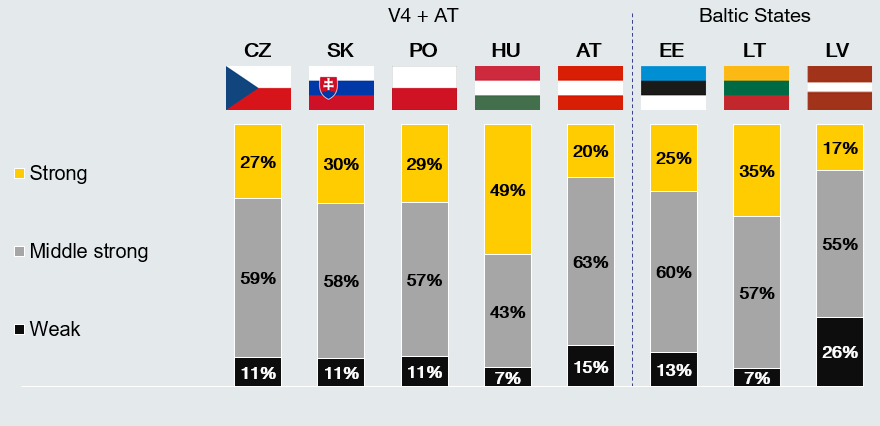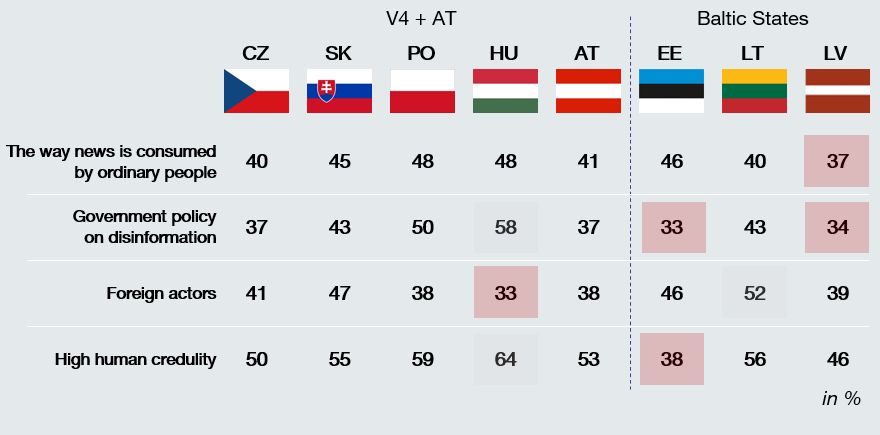More than a quarter of the Central European and Baltic population is strongly affected by disinformation
The research in eight countries of Central and Eastern Europe focused on the extent to which residents of individual countries are exposed to disinformation or which factors contribute most to disinformation in public space. The research also included a section focused on the believability of specific disinformation.
Up to half of Hungarians are strongly affected by disinformation, while in Latvia and Austria they feel the most resistant to it
There are some differences between the countries included in the research regarding the impact of disinformation. While in Hungary up to half of the population feels strongly affected, in Austria or Latvia it is less than a fifth. In the Czech Republic, 27% of the population feel strongly affected by disinformation. Disinformation, however, has a widespread effect on the entire society, so according to their own words, men and women are equally affected, at the same time there is very similar coverage of disinformation messages across all age categories.
Graph 1. To what extent do you think you are exposed to disinformation (i.e. purposefully spread false information) in the media?
The problem with disinformation is also the over-credibility of people
More than half of the population (52%) of the surveyed countries admit that the over-credibility of the people who consume this disinformation also contributes to the problem of disinformation. 42% blame foreign actors for the spread of disinformation. According to Slovaks, Lithuanians and Estonians, foreign actors contribute the most to disinformation. One in four citizens of the countries included in the research also admits that government policies also contribute to the problem of disinformation. This opinion is most often held by Hungarians, where 58% of the population agrees with this statement.
Table 1. People point to different causes of the problem of disinformation (ie purposefully disseminated false information). To what extent do you think the following factors have contributed to the disinformation problem?
Note: Asked on a seven-point scale, where 1=contributed very significantly and 7=did not contribute at all. Percentage displayed in the table; the sum of the values of 1 and 2.
Audiovisual disinformation is more believable for citizens
Part of the research was also the measurement of the believability of selected disinformation that appeared in the public European space in recent months. Disinformation about the US exporting liquefied gas from Russia to Europe was believed by more than a third of the population of the surveyed countries, with relatively small differences between countries on this issue. A larger part of the population of the surveyed countries, specifically 55%, believed disinformation, which also included a specific photo. It showed the supposed site of the Glastonbury festival, where Swedish environmental activist Greta Thunberg was scheduled to perform, which was completely covered in trash.
"It turns out that if disinformation is disseminated together with audiovisual material, it becomes more imaginable for citizens and thus more believable. This can also be dangerous in the context of new technologies, for example so-called deepfakes, which have the potential to bring even greater chaos and uncertainty to the world of disinformation," adds Ipsos analyst Michal Kormaňák.
Strengthening media literacy or supporting fact-checking platforms as a tool to combat disinformation
There are various tools that can be used to combat false and manipulative information, depending on the population of each country. More than two-thirds (69%) of the population agree that it is an effective tool for strengthening media literacy, and a similar number see it as the effective creation and support of fact-checking platforms or the removal of harmful content by the operators of the platforms on which it is located. However, people in all countries recognize that a functional tool is also the responsible behavior of social network users themselves and not forwarding information that is not verified.
"The results published today are just the first step in the presentation of our extensive research involving research organizations associated with CEDMO such as Charles University in Prague, KInIT in Slovakia, the Polish private university SWPS, and with support from Ipsos and Google. In the coming weeks and months, we will be publishing data on the issue of chain emails that spread misinformation, the perceived importance of strengthening media and digital literacy, and the impact of conspiratorial thinking on the spread of information disorders," says Václav Moravec, coordinator of the CEDMO research consortium from Charles University.
Research information:
The research was carried out from 2 September to 15 September 2022 on a representative sample of the Internet population of the Czech Republic, Slovakia, Hungary, Poland, Austria, Lithuania, Latvia and Estonia (aged 18-65). A total of 1,000 respondents participated in each country, and the data collection tool was online panels in individual countries.
The research was conducted in cooperation with the Central European Research Consortium Central European Digital Media Observatory (CEDMO) and sponsored by Google.



